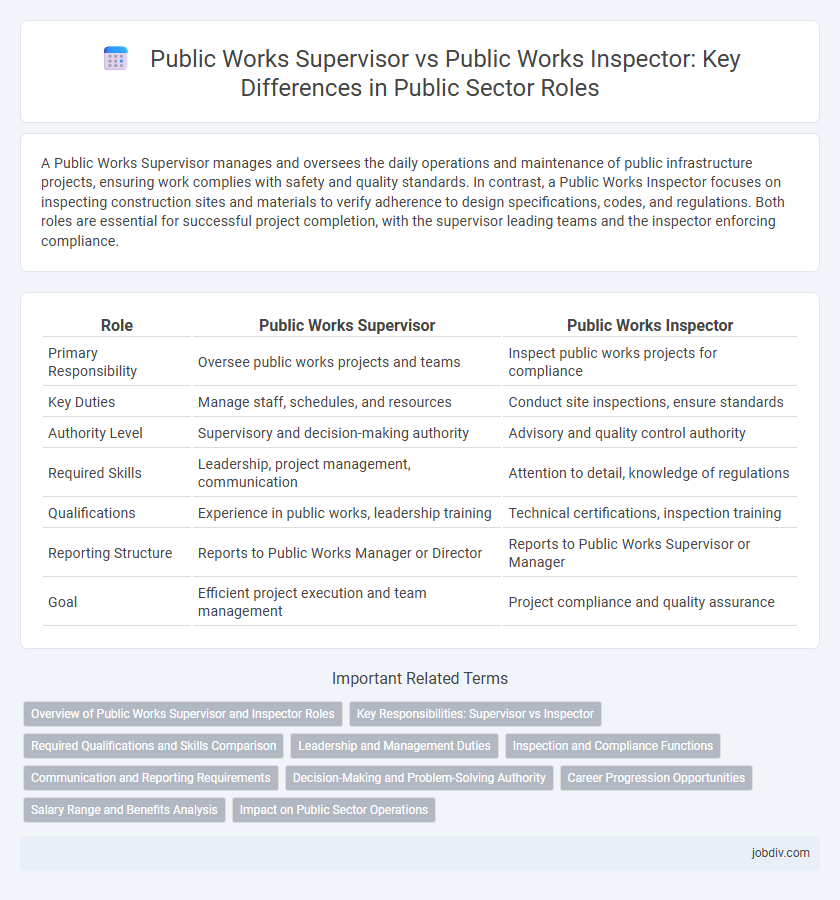A Public Works Supervisor manages and oversees the daily operations and maintenance of public infrastructure projects, ensuring work complies with safety and quality standards. In contrast, a Public Works Inspector focuses on inspecting construction sites and materials to verify adherence to design specifications, codes, and regulations. Both roles are essential for successful project completion, with the supervisor leading teams and the inspector enforcing compliance.
Table of Comparison
| Role | Public Works Supervisor | Public Works Inspector |
|---|---|---|
| Primary Responsibility | Oversee public works projects and teams | Inspect public works projects for compliance |
| Key Duties | Manage staff, schedules, and resources | Conduct site inspections, ensure standards |
| Authority Level | Supervisory and decision-making authority | Advisory and quality control authority |
| Required Skills | Leadership, project management, communication | Attention to detail, knowledge of regulations |
| Qualifications | Experience in public works, leadership training | Technical certifications, inspection training |
| Reporting Structure | Reports to Public Works Manager or Director | Reports to Public Works Supervisor or Manager |
| Goal | Efficient project execution and team management | Project compliance and quality assurance |
Overview of Public Works Supervisor and Inspector Roles
Public Works Supervisors oversee daily operations, manage staff, and ensure project completion within public infrastructure maintenance and construction. Public Works Inspectors focus on monitoring compliance with safety and quality standards, conducting site inspections, and verifying that regulations and specifications are met. Both roles collaborate to maintain efficient public works services, with supervisors directing and inspectors enforcing standards.
Key Responsibilities: Supervisor vs Inspector
A Public Works Supervisor manages daily operations, oversees staff performance, and ensures project timelines and budgets are met, focusing on leadership and resource allocation. A Public Works Inspector conducts site inspections, enforces compliance with safety and construction standards, and documents findings, emphasizing quality control and regulatory adherence. Supervisors handle strategic planning and team coordination, while Inspectors focus on technical evaluation and reporting.
Required Qualifications and Skills Comparison
A Public Works Supervisor typically requires a combination of technical expertise in civil engineering or construction management and proven leadership skills to oversee project execution and team coordination. In contrast, a Public Works Inspector needs strong knowledge of local building codes, attention to detail for assessing compliance, and experience in site inspection and reporting. Both roles demand effective communication, problem-solving abilities, and familiarity with safety regulations, but the Supervisor emphasizes management and decision-making while the Inspector focuses on quality control and regulatory adherence.
Leadership and Management Duties
Public Works Supervisors oversee project planning, resource allocation, and team leadership to ensure timely completion of infrastructure projects. Public Works Inspectors focus on enforcing compliance with regulations, conducting site inspections, and reporting on quality and safety standards. Supervisors manage staff performance and workflow, while inspectors ensure adherence to technical specifications and regulatory requirements.
Inspection and Compliance Functions
Public Works Supervisors oversee inspection schedules and ensure compliance with municipal regulations, managing teams to maintain infrastructure quality. Public Works Inspectors perform detailed site inspections, verifying adherence to safety codes, environmental standards, and project specifications. Both roles are critical for enforcing public works compliance, but inspectors focus on hands-on evaluation while supervisors coordinate inspection efforts and address compliance issues.
Communication and Reporting Requirements
A Public Works Supervisor oversees project coordination and team communications, ensuring clear, consistent updates between workers and management. A Public Works Inspector focuses on detailed reporting of compliance and quality control, providing precise documentation for regulatory adherence. Effective communication for supervisors involves leadership and delegation, while inspectors prioritize accurate record-keeping and technical report generation.
Decision-Making and Problem-Solving Authority
Public Works Supervisors hold higher decision-making authority, overseeing project execution, resource allocation, and staff management to ensure timely and efficient completion of public infrastructure projects. Public Works Inspectors focus on monitoring compliance with regulations, identifying defects, and reporting issues but have limited authority to make final decisions. Supervisors resolve complex problems by coordinating teams and adjusting workflows, while Inspectors contribute by providing detailed assessments and recommendations for corrective actions.
Career Progression Opportunities
Public Works Supervisors often advance from Public Works Inspectors, gaining leadership responsibilities and project management skills that open doors to higher management roles within municipal or regional government agencies. Inspectors develop expertise in regulatory compliance and site evaluation, serving as a foundation for supervisory positions that require overseeing teams and coordinating complex infrastructure projects. Career progression typically involves transitioning from technical inspection to strategic planning and resource allocation, enhancing opportunities for promotion in public sector infrastructure management.
Salary Range and Benefits Analysis
Public Works Supervisors typically earn between $60,000 and $85,000 annually, reflecting their leadership responsibilities over maintenance and infrastructure projects, while Public Works Inspectors have a salary range of $45,000 to $65,000, focusing on compliance and quality control. Supervisors often receive enhanced benefits such as management bonuses, retirement plan contributions, and health insurance premiums, whereas Inspectors benefit from standard public sector healthcare and pension plans. Salary and benefits differences correlate with the scope of duties, decision-making authority, and required certifications within municipal or regional public works departments.
Impact on Public Sector Operations
Public Works Supervisors oversee project execution, ensuring timely completion and adherence to safety standards, directly enhancing infrastructure reliability and public service efficiency. Public Works Inspectors conduct detailed assessments of construction quality and compliance, reducing risks and maintaining regulatory standards crucial for community safety. Both roles synergize to optimize operational workflows, minimize disruptions, and promote sustainable public sector development.
Public Works Supervisor vs Public Works Inspector Infographic

 jobdiv.com
jobdiv.com